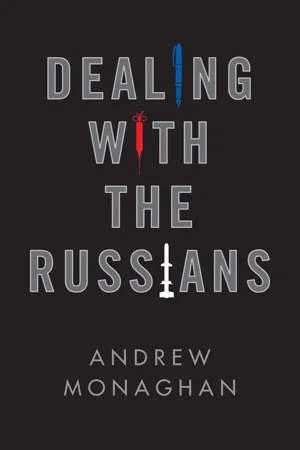Russia's Emergence as a Peer Challenger
Russia is now seen by many in the Euro-Atlantic community to pose a significant threat to international security, and to be undermining the rules-based system. Many have argued, for instance, that Moscow uses so-called ‘hybrid warfare’ to challenge the cohesion and unity of NATO and the EU and the sovereignty of their member states, particularly Estonia, Latvia, Lithuania and Poland. ‘Russian hybrid warfare’, which is examined in more depth in chapter 2, is understood as conflict-related insecurity, a strategy, according to one prominent Western thinker, to ‘confuse us and perplex us by not telling the truth’ and disorient us about Vladimir Putin's intentions.3 This has generated much talk of Moscow using ‘asymmetric means’ and ‘measures short of war’.
In this vein, many accuse Moscow of interfering in the domestic politics of Euro-Atlantic states, of funding anti-EU political parties such as the French National Front, of interfering in the UK's referendum on its membership of the EU, and of spending millions ‘to spread its version of reality in Europe, including sometimes fabrications’.4 Indeed, such accusations spread across Europe, including Germany, the Czech Republic and Spain, with some suggesting that Russian hackers and trolls tried to increase support for separatism in Catalonia in 2017. And most prominent of all, of course, are the accusations of Russian interference in the US presidential elections in November 2016.5 According to Joe Biden, US Vice President until 2017, therefore, the Russian government is ‘brazenly assaulting the foundations of Western Democracy around the world … it has sought to weaken and subvert Western democracies from the inside by weaponizing information, cyberspace, energy and corruption’.6
Numerous senior British politicians and officials have also pointed to what they see as a Russian threat. In a prominent speech in November 2017, Prime Minister Theresa May accused Russia of threatening international order, ‘fomenting conflict’, repeatedly violating the national airspace of several European countries and mounting a sustained ‘campaign of cyber espionage and disruption’.7 The UK's Secretary of Defence asserted in December 2017 that Russia was at war with the UK, and then in January 2018 that Russia was seeking ways to damage the UK's economy by attacking its infrastructure, which could create ‘total chaos and cause thousands and thousands of deaths’. He reiterated similar claims in February, noting that the UK had ‘entered a new era of warfare’ with Russian cyber attacks.8
Many also accuse Russia of indirectly and directly exacerbating the security challenges Europe faces. Philip Breedlove, then NATO's Supreme Allied Commander Europe (SACEUR), accused Russia of deliberately bombarding civilian centres in Syria to exacerbate the refugee crisis to ‘overwhelm European structures and break European resolve’.9 Equally, others see Russia as posing a direct military challenge to NATO, and putting itself on a ‘collision course’ with the alliance, particularly in terms of a possible Russian invasion of the Baltic states.10
Indeed, the use by the Russian leadership of military power to achieve policy ends has come as a shock to Euro-Atlantic officials and politicians. Many – including senior military figures – have been unpleasantly surprised by Russian military capabilities. In June 2016, the then commander of the US Army Europe, Lieutenant General Ben Hodges, pointed to the speed and scale of Russian capabilities: ‘the Russians are able to move huge formations and lots of equipment a long distance, very fast’, he noted. ‘It's concerning’, he suggested, because NATO does not have such speed. Hodges also pointed to comparative shortfalls in intelligence, surveillance, reconnaissance, short-range air defence and combat aviation.11 The Russian ‘Zapad-2017’ exercises in autumn 2017 generated something approaching panic in Western media, as observers – supported in some instances by official assessments – estimated that the exercises would be over 100,000 strong and could be a cover for an invasion of the Baltic states or of Ukraine.12 Even after the exercise was completed, prominent media sources quoted Western officials to suggest that Zapad had been a rehearsal for a ‘full-scale conventional war’ against NATO and the capture of the Baltic states, and a shock campaign against Germany and the Netherlands, Poland and Norway, as well as neutral Sweden and Finland.13
There is even concern in the US. General Joseph Dunford, then nominee chairman of the US joint chiefs of staff, told the Senate Armed Services Committee in July 2015 that Russia could pose an ‘existential threat’ to the US and that its behaviour was ‘alarming’. Subsequently, in spring 2016, he stated that the ‘Russian military presents the greatest array of threats to US interests’.14 Others, including General Mark Milley, then Chief of Staff of the US Army, have agreed, stating that Russia should be considered the number one threat to the US because of its capa...




